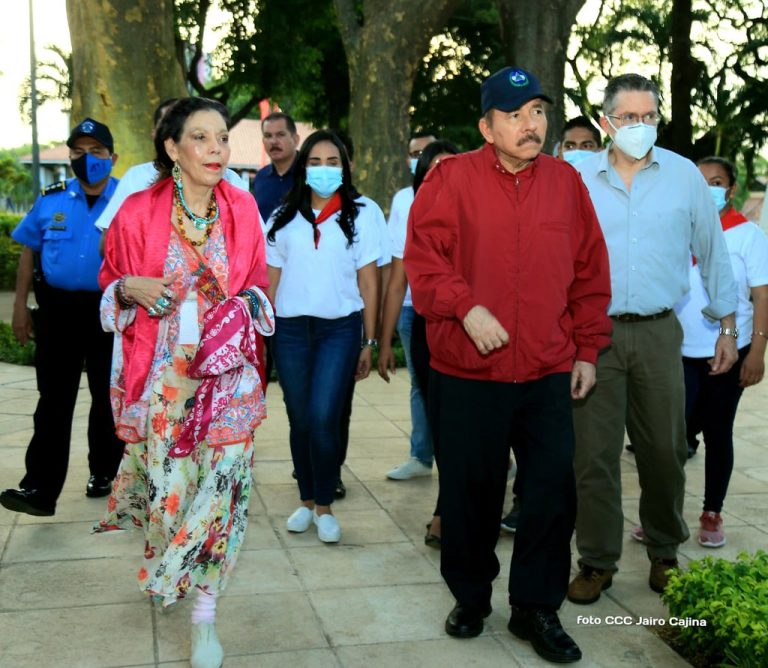26 de junio 2021

The Return of the Military

PUBLICIDAD 1M
PUBLICIDAD 4D
PUBLICIDAD 5D
Ortega and his wife aren’t going to change or cede anything until after the elections, where they’ll be reelected for another five years.

Ortega and his wife aren’t going to change or cede anything until after the elections
In July 1979, the Sandinista National Liberation Front (FSLN) overthrew the dictatorship of the Somoza dynasty in Nicaragua. At first, nine comandantes assumed joint leadership of the government.
In 1990, the FSLN held elections to legitimize their power. Eleven years had passed since the Revolutionary triumph. They were sure of their victory. All through the electoral campaign, Ortega never said the words that all society wanted to hear: that the obligatory military service would be suspended.
The young draftees participated in the war against the Contra that began in 1980 and continued until 1991. The Contra were a military force that was trying to defeat the Sandinista government, with support from the United States. Families didn’t want their sons to go to war.
In 1990, the elections were held, and Violeta Chamorro won. The new president was the widow of journalist Pedro Joaquin Chamorro, who had been assassinated by orders of the dictator, Anastasio Somoza. The defeat was a crushing blow to Ortega personally, and also to the FSLN. They never expected it. Seventeen years would pass before they succeeded in returning to power.
By then, the FSLN under the full control of Ortega, hardened its stance, completely shutting out the more democratic leaning Sandinistas. A group of them broke with the party to form the Sandinista Renewal Movement in 1995. In 2007, Ortega once again won the elections, and once more assumed the presidency.
In order to assure his continuance in power, Ortega and his operatives reformed the Constitution to allow for indefinite consecutive reelection. He opened a space for dialogue and trust with the most powerful business sectors and the Catholic hierarchy. He reached agreements with them.
Subsequently, Ortega and Rosario Murillo -his wife and vice president-, took control of all the government branches and the autonomous institutions, which became subservient to Ortega’s rule and that of his wife. The construction of the dictatorship had begun.
The possibility of once again holding elections that were recognizable as such was terminated. Once they had finally obtained power once more, they weren’t going to put it on the line again. They came to stay. What happened in 1990 would never again befall them.
As the years passed, given the closure of all spaces for political participation, the suspension of free expression, the growing authoritarianism, expressions of discontent arose and were repressed. The regime killed hundreds of protesters in 2018.
Next November, there’ll be elections in Nicaragua. In order to avoid any minimal risk of losing the presidency they share, the president and his wife have intensified the repression, raising it to new levels.
They’ve imprisoned five opposition contenders for the presidency. They’ve also jailed historic revolutionary leaders, social leaders, and journalists. The number of political prisoners rises. No one can challenge their power: the imperial family – as poet and priest Ernesto Cardenal called them – own the country. That’s not up for discussion.
The imperial family, like all dictatorships, isn’t going to give up power. They’re burning their bridges and hardening the dictatorial regime they head. To hell with any supposed democracy, legality, the international community and of course with any true elections.
Ortega and his wife aren’t going to change or cede anything until the elections occur and they’re once again reelected for another five years, until 2026. They’ll have been in power for 20 consecutive years. After once more assuming the presidency, they claim, they’ll be ready for dialogue and negotiation. Not before. What to do?
*This article was originally published in Spanish in Confidencial and translated by Havana Times.
PUBLICIDAD 3M
Sociofundador de Afan Consultores Internacionales, S.C. Doctor en Ciencias Sociales. Profesor en el Departamento de Comunicaciones y Ciencias Políticas de la Universidad Iberoamericana. Publica semanalmente en diversos periódicos y revistas del país.
PUBLICIDAD 3D